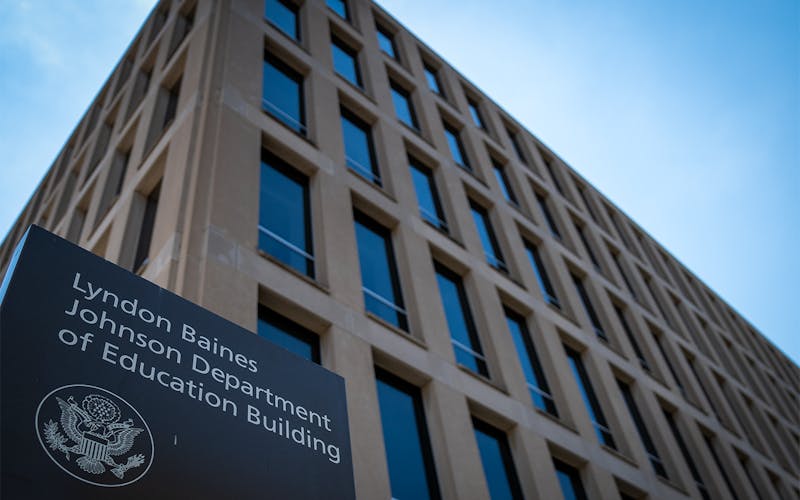
Dear President Magill, Provost Jackson, and Dean Fluharty,
We are writing as Jewish members of the Penn community to express our enthusiasm for the Palestine Writes Literature Festival, and to call for an immediate revision of your Sept. 12 statement. We look forward to celebrating this extraordinary gathering of our Palestinian classmates, students, colleagues, and neighbors. As organizer Susan Abulhawa details, “Palestine Writes is the first time your Palestinian students will see their heritage, brilliance, and lived experiences celebrated on Penn’s campus.”
Across the Penn community, Palestinian and Arab students, anti-occupation groups, Jewish students, festival organizers, and Penn faculty have already made clear that your Sept. 12 statement about the festival undermines the well-being of community members. The statement has caused fears for students’ safety. In the statement’s choice of language and selective use of the first person, associating a Palestinian event with accusations of bigotry took precedence. It took precedence over acknowledging the violence that Palestinian organizers have endured to build community and the unprecedented opportunities they are bringing to Penn’s students of literature, cinema, history, politics, visual arts, performing arts, and Middle Eastern Studies.
This festival program is about Palestinian lives across religious and ethnic identities. By using this celebration of Palestinian literary traditions as an occasion to condemn antisemitism, your statement further marginalizes Palestinian experiences on campus, while supporting attempts to conflate Palestinian liberation with antisemitism. Our colleagues who claim to speak for all of Penn’s Jews are simply expressing their own and their associates’ discomfort with the wide-ranging resistance that apartheid inevitably inspires.
We call for you to make clear your support for Palestinian students on campus, who are most impacted by the accusations that your initial statement attempts to legitimize. Further, we call for your assurance that the many Penn students, staff, and faculty who are participating in Palestine Writes will be able to safely attend this festival, and that you will not repress their freedom of expression.
Penn faculty have rightfully indicated that critics of the Festival have tried to deny this event “the diversity of viewpoints that comprise the Palestinian condition.” As Jews, we are intimately familiar with the propaganda efforts that try to prevent our communities from taking the time, effort, and self-reflection to act with respect for Palestinian diversity. We see how the Festival’s critics have flattened all Palestinian culture and resistance to apartheid into a monolithic voice. They condemn the event without having attended it yet, and without even exploring panels of positive interest from its program. It is telling that critics of Palestine Writes are talking about the same handful of scenes and posts that have blown up online, often while misrepresenting the primary source. It is telling that they are not talking about which Hakawati storytelling performance on the program most interests them, or about how the La La Lil Jidar Collective cultivated the relationships necessary to document 20 years of life behind the apartheid wall in photographs, or even about any serious readings of published literature by the Festival’s speakers. The attacks on Palestine Writes are not about Palestine Writes. They do not address the content of the festival. What these attacks do is make it harder to address actual cases of antisemitism on campus and in the world — cases that are structurally driven by white nationalism. The effect of these attacks is not to stop antisemitism; their effect is to silence and endanger Palestinians.
As we join the chorus of collectives supporting the Festival, it should be increasingly clear that the attacks on the Festival, and your own statement, do not represent the positions of Penn’s community, its Jewish community, or that of the larger Philadelphia community. We hope that your support for Jews and Jewish students is not contingent on their political persuasions, and we hope that your support for Penn students more broadly is not contingent on their ethnicity, nationality, or race. We join in the demand of Penn student groups and faculty that you immediately revise your statement. We call for you to emphasize that Palestinian activism has no inherent relation with antisemitism, that the University will protect the safety of Festival attendees, and that Palestinian students, artists, writers, and thinkers are welcome and celebrated on this campus.
Signed,
Concerned members of the Penn Jewish community
- Hilah Kohen
- Asher Maria
- Jack Starobin
- Daniel Frederick Shapiro
- Julia Alekseyeva
- Rosie Poku
- Rebecka Hess
- Samantha Tavlin
- Tali Ruskin
- Olivia Haynie
- Keren Weitzberg
- Kyla Mace
- Aimee Ando
- Harry Russell
- Naomi Zucker
- Isabel Yannatos
- Karey Bacon
- Alexandra Kirby Sokolow
- Marta Guttenberg
- Alexandra Batzdorf
- David Halpern
- Maya Gomberg
- Caroline Lewis
- Emma Wennberg
- Rudy Gerson
- Julia Flores
- Amanda Wessel
- Ariel Censor
- Billy Blender
- Madeline Rose Kessler
- Hillary Kane
- Anat Dan
- Emerson Waterbel
- Rona Buchalter
- Barbara W. Gold
- Stephen Gold
- Benjamin Moss-Horwitz
- Nitzan Lebovic
- Abby Schrader
- Deborah Bishov
- Joshua Block
- Nicole Sugerman
- Matthew Feldman
- Nimrod Ben Zeev
- Gabriel Kalmuss-Katz
- Hop Wechsler
- Harvey Finkle
- Zoe Kerrich
- Andrew Zitcer
- Karen Lefkovitz
- Dan Berger
- Suzanne Blanc
- Robert J. Brand
- David Kutzik
- Ella Israeli
- Becky Havivi
- Lauren Fine
- Zachary Endter
- Julie Krug
- Josh Hoffman
- Diane Laison
- Maddie Rabin
- Shoshana Adler
- Alisha Berry
- Marc Stein
- Nava EtShalom
- Rebecca Alvarez
- Hannah Lukow
- Josh Kadish
- Amy Horowitz
- Josh Mitteldorf
The Daily Pennsylvanian is an independent, student-run newspaper. Please consider making a donation to support the coverage that shapes the University. Your generosity ensures a future of strong journalism at Penn.
Donate






